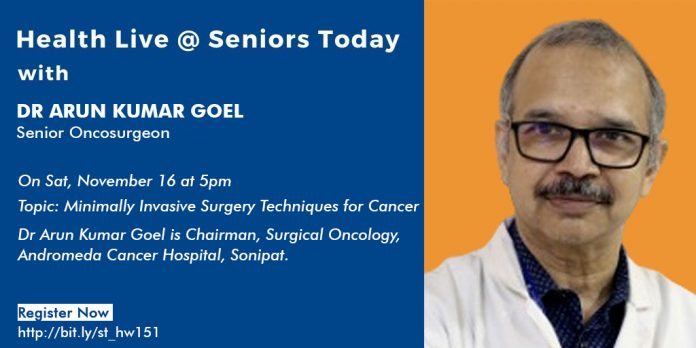Dr Arun Kumar Goel is Chairman, Surgical Oncology, Andromeda Cancer Hospital, Sonipat, Haryana
Dr Arun Kumar Goel is one of the leading surgical oncologists of northern India with more than 35 years of surgical experience. Dr Goel is an alumnus from AIIMS, New Delhi. He received his surgical oncology training at Dr BR Ambedkar Institute Rotary Cancer Hospital, AIIMS. He has been in practice for more than 25 years and has been associated with some of the leading oncology hospitals in Delhi and NCR.
Prior to joining Andromedia, he was Senior Director, Surgical Oncology at Max Superspecialty Hospital, Vaishali and Patparganj (Breast & GI Oncology). He has been associated with Northern Railway Central Hospital as a visiting consultant in Surgical Oncology from 2005 till date.
Dr Goel has multiple areas of interest in surgical oncology including breast oncology, gastrointestinal oncology, gynaecologic oncology and has been performing complex surgical procedures for nearly three decades with highly successful outcomes. He is also trained in the field of minimally invasive surgery as well as robotic surgery for cancers.
Dr Goel has been involved in academics and research from his days at AIIMS. He has more than 70 publications in various national and international journals. He has contributed chapters in textbooks of surgery and oncology.
He is also a reviewer for many oncology journals. Dr Goel is a founding member of Oncology Forum of Delhi & NCR. He is alsoa life member of multiple national and international professional organisations in the field of oncology.
The field of laparoscopic and minimally invasive surgery in cancer has see a lot of technical advancements, which was earlier believed to have no to very little role in the treatment of cancer. Laparoscopic surgery has now allowed us to perform almost all kinds of surgeries in a cancer patient through a minimally invasive approach.
Another significant advancement in the field of oncosurgery is robotic surgery which is also a type of minimally invasive surgery. Cancer is now a common disease with its burden increasing with every passing year.
The risk of cancer incidence increases with increasing age; and so there is an increase in the number of cases of cancer that increase after the age of 40. 50-60 are usually the peak for a lot of cancers. And some cancers occur at a later age such as the prostate cancer which has a higher incidence of occurrence at and beyond the age of 70.
Broadly when we speak about cancer treatment, there are 3 pillars that the treatment modality strongly supports on:
- Surgery
- Radiotherapy
- Chemotherapy.
Most of the cancers generally require some combination of the above mentioned treatments.
Surgery and radiotherapy are called local treatments which are applied to a specific area of the body.
Chemotherapy is a form of systemic treatment. It is given either orally or intravenously. However, there are certain cases wherein chemotherapy can also be given regionally/ locally Surgery for cancer is different for surgery in a non cancerous disease in its complexity and detailing.
Surgery for cancer not involves removing the cancerous part/ mass/ lump, to also includes removing the healthy tissue around the cancer.
In a traditional/ open surgery the cancerous lesion can be felt as a hard structure and the surgeon tends to go 1- 2 cm beyond that area, this 1- 2 cm becomes the margin (of healthy/ normal) of tissue around the cancer.
In addition to removal of normal tissue, we also remove the lymph nodes since cancers can spread through the lymph nodes.
After removing the cancerous part, oncosurgery also requires reconstruction of the tissue. Most cases require some kind of plastic and reconstructive surgery to establish the structure, maintain the function and cosmetic and aesthetic appearance of the area.
In addition to the aforementioned points, we also need to focus on early recovery of the patient since a lot of cancer patient requires other forms of treatment as well.the sooner the patient recovers from the surgery, the quicker he can be started on other treatments.
Minimally invasive cancer surgery today has a proven, established role.
However, it also needs to be understood that it cannot be blindly used for each and every cancer case. The cases need to be chosen; it is not useful in bulky/ advanced.
Properly choosing the case/ case is important Adequate information about the cancer including the site, size, staging of the Cancer is necessary. Training of the surgeon is very critical. Endoscopic surgery is a type of minimally invasive surgery approach but not very commonly used for cancer patients. However it can be used for upper GI cancers, or can be used to gain access per vaginally or through the rectum and a colonoscope.
Laparoscopic and thoracoscopic surgery are surgeries for the abdomen and thorax respectively which are both natural body cavities making it easier for the surgeon to use laparoscopic instruments.
Laparoscopic surgery is also known as key hole surgery.
In minimally invasive surgery, unlike open surgery, the tactic sensation is lost which is why the surgeon needs plan the extent of surgery based on imaging- CT scan, MRI, PET CT. In addition to this, there is also something down as intraoperative ultrasound.
The problem with large incisions/ open surgery:
Post operative pain
Large incision site with higher risk of infection
Large, cosmetically displeasing scars
More blood loss
Late recovery
Benefits of minimally invasive surgery:
– Smaller, occasionally hidden scars
– Aesthetically and cosmetically better
– Lesser blood loss
– Early recovery and return to work/ starting next treatment
Disadvantages of minimally invasive surgery:
– Complex surgeries in a minimally invasive approach may require longer surgery time
– Can be tiresome for the surgeon
– Has a learning curve
– Not all cases can be operated
– Additional equipment is required for the setup, adding additionally to the cost
– If things do not go as planned, the last resort in a minimally invasive surgery is converting to an open surgery.








